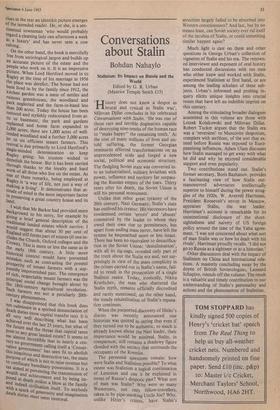Conversations about Stalin
Bohdan Nahaylo
Stalinism: Its Impact on Russia and the World Edited by G. R. Urban (Maurice Temple Smith £15) 'History does not know a despot as brutal and cynical as Stalin was', Milovan Djilas concludes in his celebrated Conversations with Stalin. 'He was one of those rare and terrible dogmatists capable of destroying nine-tenths of the human race to "make happy" the remaining tenth.' At the cost of many millions of lives and un- told suffering, the former Georgian seminarist effected transformations on an unprecedented scale and forged a new social, political and economic structure. The fledgling Soviet state was converted in- to an industrialised, military leviathan with power, influence and territory far surpass- ing the Russian empire of the tsars. Thirty years after his death, the Soviet Union is still his personal monument.
Unlike that other great tyranny of the 20th century, Nazi Germany, Stalin's state has outlived his creator. His successors have condemned certain 'errors' and 'abuses' committed by the leader to whom they owed their own rise to prominence, but apart from ending mass terror, have left the system he bequeathed more or less intact. There has been no equivalent to denazifica- tion in the Soviet Union: `destalinisation', with all its zig-zags, revealed only part of the truth about the Stalin era and, not sur- prisingly in view of the mass complicity in the crimes carried out in Stalin's name, fail- ed to result in the prosecution of a single Stalinist zealot. Today, ironically, Nikita Krushchev, the man who shattered the Stalin myth, remains officially discredited and rarely mentioned; on the other hand, the steady rehabilitation of Stalin's reputa- tion continues.
When the purported discovery of Hitler's diaries was recently announced one historian was quoted as saying that even if they turned out to be authentic, so much is already known about the Nazi leader, their importance would be minimal. Stalin, in comparison, still remains a shadowy figure clouded with the secrecy that surrounds the occupants of the Kremlin.
The perennial questions remain: how were Stalin and Stalinism possible? To what extent was Stalinism a logical continuation of Leninism and can it be explained in terms of Russia's despotic past? What sort of man was Stalin? Why were so many Westerners, not only fellow-travellers, taken in by pipe-smoking Uncle Joe? Why, unlike Hitler's crimes, have Stalin's
atrocities largely failed to be absorbed into Western consciousness? And last, but by no means least, can Soviet society ever rid itself of the incubus of Stalin, or could something similar happen again?
Much light is cast on these and other questions in George Urban's collection of vignettes of Stalin and his era. The renown- ed interviewer and exponent of oral history has conducted discussions with ten men who either knew and worked with Stalin, experienced Stalinism at first hand, or are among the leading scholars of these sub- jects. Urban's informed and probing in- quiry elicits unique insights into crucial issues that have left an indelible imprint on this century.
Among the stimulating broader dialogues assembled in this volume are those with Leszek Kolakowski and Milovan Djilas. Robert Tucker argues that the Stalin era was a 'reversion' to Muscovite despotism, complete with serfdom, of the sort that ex- isted before Russia was exposed to Euro- peanising influences. Adam Ulam discusses how Stalin managed to get away with what he did and why he enjoyed considerable support and even popularity.
Two contributions stand out. Stalin's former secretary, Boris Bazhanov, provides a fascinating view of how Stalin out- manoeuvred adversaries intellectually superior to himself during the power strug- gles of the 1920s. W. Averrell Harriman, President Roosevelt's envoy in Moscow, appraises Stalin, the war leader. Harriman's account is remarkable for its unintentional disclosure of the short- sightedness and naivety of US foreign policy around the time of the Yalta agree- ment. 'I was not concerned about what sort of man Stalin was or how he dealt with his rivals', Harriman proudly recalls. 'I did not go to Russia as a sightseer or as a historian.'
Other discussions deal with the impact of Stalinism on China and international rela- tions. A masterly concluding essay by the doyen of British Sovietologists, Leonard Schapiro, rounds off the volume. The result is a valuable and timely contribution to our understanding of Stalin's personality and actions and the phenomenon of Stalinism.














































 Previous page
Previous page